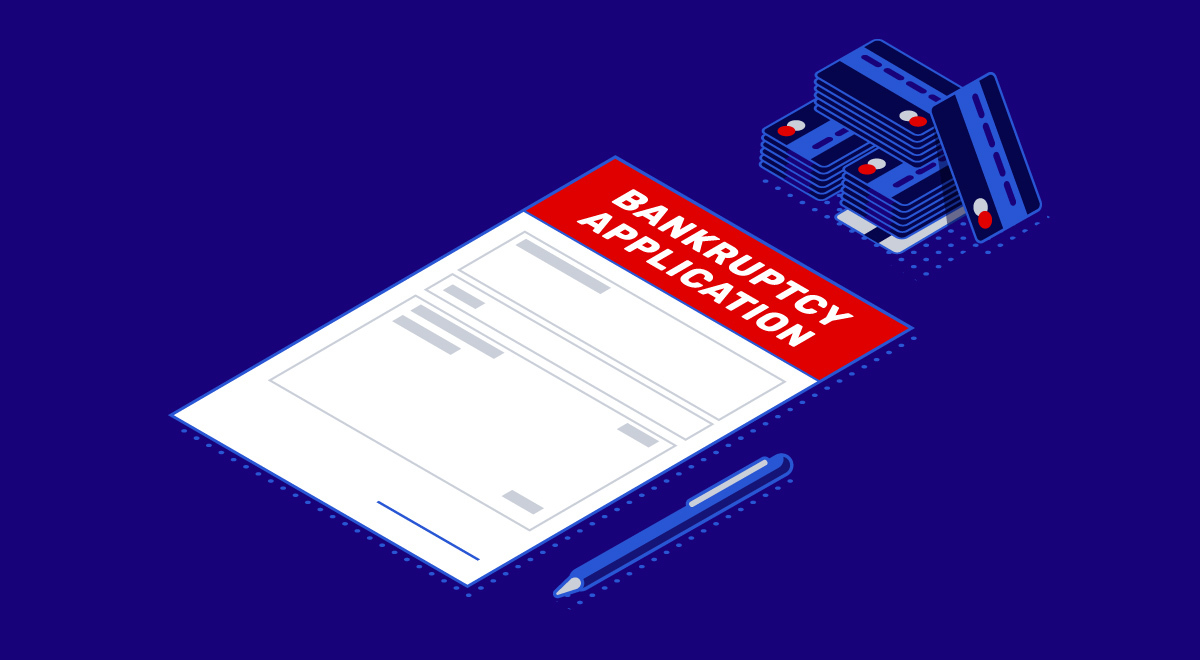Whether or not to file for bankruptcy to wipe out credit card debt is not an easy decision to make. But it may be the best option to create a clean slate and get your financial life back in order. However, you should know that filing for bankruptcy is not the only credit card debt relief option.
What Does It Mean To File Chapter 7?
People often turn to Chapter 7 bankruptcy to erase (or discharge, in legal lingo) their credit card debt — most of which is unsecured. That means there’s no collateral, such as a house or car, that a creditor can take to help cover the debt you owe.
Federal courts handle all bankruptcy cases — including Chapter 7, which typically enables someone to wipe out all of their unsecured debts, including credit card bills.
As soon as you or your lawyer files court documents for Chapter 7 bankruptcy, you’re usually no longer required to make payments on most unsecured debts included in your bankruptcy case.
What Are The Requirements For Bankruptcy?
Requirements for bankruptcy differ based on whether you’re filing a Chapter 7 case (which wipes out debt) or a Chapter 13 case (which sets up a three- or five-year debt repayment plan.)
To qualify for Chapter 7, you must pass a so-called “means test”, which looks at how much income you earn and what your expenses are. The formula subtracts certain monthly expenses from your monthly income to arrive at a number for “disposable income”. As your disposable income goes up, the odds of qualifying go down. The test is designed to curb the number of high-income people attempting to wipe out their debts with Chapter 7.
If someone doesn’t pass the means test, they can pursue Chapter 13 bankruptcy. This lets them repay some or all of their debts under a court-ordered payment plan.
Another big difference between Chapter 7 and Chapter 13 bankruptcy is the debt limits. Chapter 7 doesn’t restrict the amount of debt that can be wiped out. But Chapter 13 only applies if your secured or unsecured debt stays below a specific limit.
Also, in Chapter 7 or Chapter 13 case, secured debt can be wiped out, too. But unlike Chapter 7, Chapter 13 prevents a mortgage lender from foreclosing on your home. (A mortgage is considered a secured debt since your home serves as collateral.)
Requirements for Chapter 7 bankruptcy
- You must complete a pre-bankruptcy course taught by a credit counseling agency.
- You must list your assets, liabilities, income, expenses, current contracts, and unexpired leases in court documents.
- You must provide a summary of your financial situation.
- You must supply copies of tax returns.
- You must pay $335 in court fees and charges.
Requirements for Chapter 13 bankruptcy
- Your unsecured debt can’t exceed $419,275 and your secured debt can’t exceed $1,257,850.
- You must provide a list of your assets, liabilities, income, expenses, current contracts, and unexpired leases in court documents.
- You must submit copies of tax returns.
- You must provide an overview of your financial situation.
- You must pay $335 in court fees and charges.
Exceptions To Discharging Credit Card Debt
Chapter 7 and Chapter 13 bankruptcy laws include exceptions to the types of credit card debt that can be wiped out.
In either case, credit card debt tied to the purchase of luxury goods and services totaling at least $725 within 90 days of filing for bankruptcy may be considered fraudulent. So, it’s likely that the court won’t wipe out any of the debt connected to luxury goods and services (like an engagement ring or plane tickets.)
Similarly, credit card debt for a cash advance totaling $1,000 or more that was taken out within 70 days of a bankruptcy filing can’t be discharged.
How Does Bankruptcy Affect Your Credit?
If you wipe out credit card debt through Chapter 7 or Chapter 13 bankruptcy, that information will stay on your credit report for years to come. In a Chapter 7 case, the information will appear on your credit report for 10 years. For Chapter 13, it’s seven years.
As long as a bankruptcy remains on your credit report, it will affect your credit score.
“Bankruptcy impacts a credit score more than any other singular event in a credit report,” according to the Association for Financial Counseling & Planning Education.
The Association says a bankruptcy may initially drop your credit score anywhere from 100 to 225 points.
However, a Chapter 7 bankruptcy may actually improve your credit score right after your debts have been erased. That’s because your accounts will show up on your credit report as having no balances and no-past due amounts. Once your credit score enjoys an immediate bump from debts being discharged in a Chapter 7 case, major improvements in the score won’t come for several months or even years. Chapter 13 doesn’t have the same immediate effect because it takes a few years to pay off your debts. In either case, you might see your credit score rise 12 to 20 points a year until bankruptcy no longer appears on your credit report.
How to recover from bankruptcy
To rebound from bankruptcy and rebuild your credit, experts suggest obtaining a secured credit card. You apply for a secured credit card the same way you do with a traditional (unsecured) credit card. But in order to get a secured credit card, you must make a refundable security deposit upfront. That’s not required for a traditional credit card. The deposit guarantees the amount of credit that the card issuer will give you.
Most issuers of secured credit cards report your payment activity to credit bureaus. So, positive payment activity can boost your standing in the eyes of credit card issuers and other lenders. (Keep in mind that negative activity, such as late payments, can harm your ability to restore your credit.) Once you establish a solid history with a secured card, you may be able to “graduate” to a traditional unsecured card and get your credit back on track even more..
Options For Paying Off Debt Without Filing For Bankruptcy
If you decide that bankruptcy isn’t the right option for paying off your credit card debt, you’ve got alternatives. Here are three of them.
1. Negotiate with creditors
When you’ve fallen behind on paying credit card bills, you might try working out a payment plan with the issuers of those cards. If a credit card issuer hasn’t already contacted you, reach out to them and ask to speak with someone about setting up a payment plan. Tell the issuer how much you can afford to pay each month. If the card issuer agrees to a payment plan, be sure to get the details in writing.
2. Seek assistance from a credit counseling agency
Are you uncomfortable about the idea of negotiating with your creditors? If so, you might try getting help from a nonprofit credit or debt counseling agency. A counselor will negotiate with credit card issuers to lower your interest rates, for example, and will work with you on a plan to pay back your credit card debts over time.
3. Get help from a debt settlement company
An alternative to credit counseling is debt settlement. A for-profit company like National Debt Relief negotiates with creditors, such as credit card issuers, to reduce the amounts you owe and consolidate your debts into one lower monthly payment. In exchange, a debt settlement company receives a fee of 15% to 25% of the total amount of debts covered.
Evaluate Your Options
If you decide to file for bankruptcy, carefully consider which type of bankruptcy (Chapter 7 or Chapter 13) will work best for you. Also, give a lot of thought to the long-term effect of bankruptcy on your credit — a bankruptcy filing can stay on your credit report for seven or 10 years, depending on which type of bankruptcy you pursue.
Take comfort in the fact that bankruptcy isn’t the only option for paying off your debt. You also can negotiate with your creditors, get help from a consumer credit counseling agency or seek assistance from a debt settlement company. Whatever you decide to do, be aware that the sooner you tackle your debts, the sooner your finances will be in better shape.
At National Debt Relief, we take pride in empowering people to regain their financial stability through our proven debt relief program. Contact us and talk to a financial expert who will work with you to find the best option to settle your debt and help you achieve financial independence.







